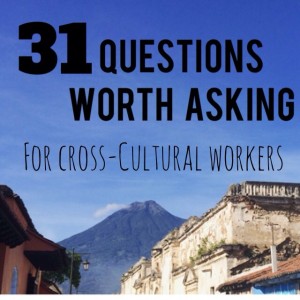Posts Tagged ‘questions for cross-cultural workers’
I realize I am making an erroneous leap, assuming that all cross-cultural workers are working with people in poverty. I know that is not the case. There are cross-cultural conversations happening all the time across board rooms and school rooms that involve people from two different cultures, but similar level of socioeconomic status (SES). However, there are a large proportion of cross-cultural workers who are partnering with people in poverty. And it is for them that I address this question.
How do you define poverty?
Because I am going to suggest that how we define poverty deeply affects how we seek to alleviate it.
Most people from the US automatically define poverty in terms of a lack of material things. Be it water, health insurance, a home or a job. Most North Americans, especially those who have not spent much time with people who live in poverty, think the lack of these material things is what constitutes poverty. And it’s true in part. There are real hardships when you don’t have access to basic material things. However, when the World Bank* asked 60,000 people living around the world in poverty to describe “what is poverty?” 90% of the time they described an emotional or physiological feeling, not a lack of material things. What people mentioned was lacking dignity and not having enough opportunities. They said poverty was feeling like your voice didn’t matter, or worse, that they didn’t matter. People mentioned having the desire to be seen and to be listened to. They talked about feeling shame and embarrassment.
Our staff and organization has spent a lot of time reading and discussing, When Helping Hurts. If you’re looking for just one resource to challenge the way you or your non-profit board or church thinks about poverty I can’t recommend it enough. Steve Corbett and Brian Fikkert weave their unique experiences of local and international work in cross-cultural settings and their background in economic development together. The Chalmers Center has done extensive reasearch and training in helping cross-cultural workers better understand how to alleviate poverty.
One of the things that I have loved is how they expand the definition to include 4 different types of poverty:
- Poverty of Being - a broken relationships with Self. I call it Emotional Poverty and it can be from having a low self-esteem, not valuing yourself or on the other end thinking too highly of yourself, having what the authors call a “savior complex.”
- Poverty of Community- a broken relations with Others. I think of it as Relational Poverty. What relationships are broken in your life, either in your neighborhood or across the globe? Abuse and exploitation of others fits into this relational poverty both from a micro standpoint, like in a family system and a more macro standpoint, like from a systemic or societal cause.
- Poverty of Stewardship- a broken relationship with nature or creation. I think of this has Environmental Poverty. It is not just poorly caring of our earth and environment, although that is part of it. But it is also the poverty of not being able to work or to have a sense of purpose.
- Poverty of Spiritual Intimacy- a broken relationship with God. I think of this has Spiritual Poverty. It comes from the idea that all people are spiritual beings and when we live disconnected, un-purposeful lives or place our self-worth in what we have we become broken from God and our spiritual selves.
Now they obviously see poverty and the world through a Christian lens, but even if you don’t identify as a Christian, I think you can still use these descriptions to help understand the different types of poverty in your life or community.
So you see, when we talk about the materially poor in our world we are not just talking about people who don’t have access to food and basic water and sanitation. That would be too one-demensional. We are talking about people, complex, three-dementias, whole people.
When we talk about poverty we are talking about people who yes, often lack materially things, but also lack the purpose and meaning that comes from having job and an economic system that provides security and safety. These are people who often lack trust in relationships or have lost people close to them and with that comes certain kind of poverty. There are people who suffer environmental poverty because corrupt governments have contained their rivers and land and they have no option for clean drinking water.
I am not saying all poverty is created equal. Or that the relational poverty you feel when you and your neighbor can’t agree is the same kind of poverty a woman in Ethiopia feels when she has to choose between buying medicine for her baby or food to feed her family. By gosh, no.
But what I am saying is that before we try to help the materially poor, we have to fist identify and acknowledge what is our own poverty?
More on that tomorrow.
For previous questions in the 31 Questions for Cross-Cultural Workers Series click here.
Also, if you’re interested in learning more about poverty and development, but don’t have time to read a book, you can watch this 15-min video from the Chalmers Webpage which has some great resources.
*World Bank fact came from the afore-mentioned video

